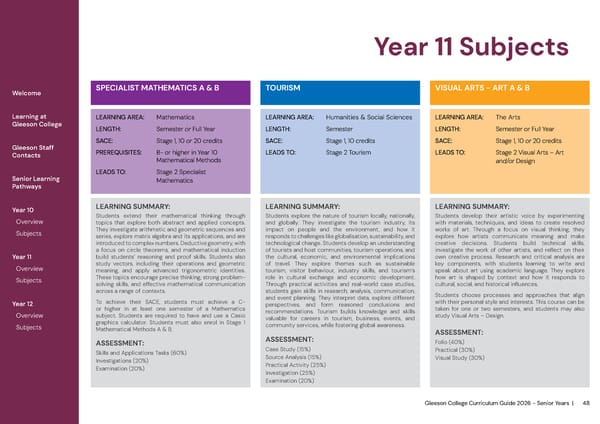Gleeson College Curriculum Guide 2026 - Senior Years | 48 Year 11 Subjects Welcome Learning at Gleeson College Gleeson Staff Contacts Senior Learning Pathways Year 10 Overview Subjects Year 11 Overview Subjects Year 12 Overview Subjects SPECIALIST MATHEMATICS A & B LEARNING AREA: Mathematics LENGTH: Semester or Full Year SACE: Stage 1, 10 or 20 credits PREREQUISITES: B- or higher in Year 10 Mathematical Methods LEADS TO: Stage 2 Specialist Mathematics LEARNING SUMMARY: Students extend their mathematical thinking through topics that explore both abstract and applied concepts. They investigate arithmetic and geometric sequences and series, explore matrix algebra and its applications, and are introduced to complex numbers. Deductive geometry, with a focus on circle theorems, and mathematical induction build students’ reasoning and proof skills. Students also study vectors, including their operations and geometric meaning, and apply advanced trigonometric identities. These topics encourage precise thinking, strong problem- solving skills, and effective mathematical communication across a range of contexts. To achieve their SACE, students must achieve a C- or higher in at least one semester of a Mathematics subject. Students are required to have and use a Casio graphics calculator. Students must also enrol in Stage 1 Mathematical Methods A & B. ASSESSMENT: Skills and Applications Tasks (60%) Investigations (20%) Examination (20%) TOURISM LEARNING AREA: Humanities & Social Sciences LENGTH: Semester SACE: Stage 1, 10 credits LEADS TO: Stage 2 Tourism LEARNING SUMMARY: Students explore the nature of tourism locally, nationally, and globally. They investigate the tourism industry, its impact on people and the environment, and how it responds to challenges like globalisation, sustainability, and technological change. Students develop an understanding of tourists and host communities, tourism operations, and the cultural, economic, and environmental implications of travel. They explore themes such as sustainable tourism, visitor behaviour, industry skills, and tourism’s role in cultural exchange and economic development. Through practical activities and real-world case studies, students gain skills in research, analysis, communication, and event planning. They interpret data, explore different perspectives, and form reasoned conclusions and recommendations. Tourism builds knowledge and skills valuable for careers in tourism, business, events, and community services, while fostering global awareness. ASSESSMENT: Case Study (15%) Source Analysis (15%) Practical Activity (25%) Investigation (25%) Examination (20%) LEARNING SUMMARY: Students develop their artistic voice by experimenting with materials, techniques, and ideas to create resolved works of art. Through a focus on visual thinking, they explore how artists communicate meaning and make creative decisions. Students build technical skills, investigate the work of other artists, and reflect on their own creative process. Research and critical analysis are key components, with students learning to write and speak about art using academic language. They explore how art is shaped by context and how it responds to cultural, social, and historical influences. Students choose processes and approaches that align with their personal style and interests. This course can be taken for one or two semesters, and students may also study Visual Arts – Design. ASSESSMENT: Folio (40%) Practical (30%) Visual Study (30%) VISUAL ARTS - ART A & B LEARNING AREA: The Arts LENGTH: Semester or Full Year SACE: Stage 1, 10 or 20 credits LEADS TO: Stage 2 Visual Arts – Art and/or Design
 2026 Gleeson College Senior Years Curriculum Guide 2026 Page 47 Page 49
2026 Gleeson College Senior Years Curriculum Guide 2026 Page 47 Page 49